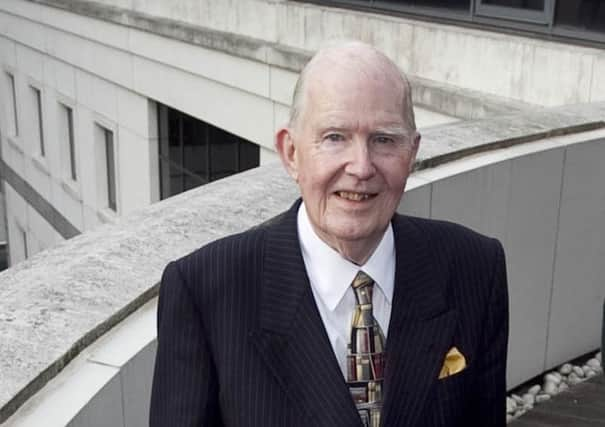Declassified files: Ulster Bank chairman privately urged major terror legal changes


Sir George Quigley’s letter to Sir Patrick Mayhew, which came against the backdrop of an intense IRA campaign to bomb town centres across Northern Ireland, is contained within a file declassified at the Public Record Office in Belfast under the 20 Year Rule.
Sir George, a former Stormont permanent secretary who had retired in 1988 and taken on a series of directorships of some of Northern Ireland’s biggest companies, wrote the letter in his capacity as chairman of Ulster Bank.
Advertisement
Hide AdAdvertisement
Hide AdHe urged the government to re-examine the right to silence and allow the courts to give “proper weight” to intelligence material.
Setting out the disruptive impact of recent attacks on the bank’s business, Sir George made clear that terrorist attacks had not “diminished our resolve to pursue our business interests here vigorously and make the fullest possible contribution to economic life in Northern Ireland”.
He said that the recent IRA bomb in Magherafelt - in which a van packed with 1,500lb of explosives devastated the town centre - had prompted him to initiate a review of the position over the past 18 months.
The review found that there had been three incidents affecting the branch in Belfast’s Markets area, two of which were directed specifically at the bank and one of which caused some £60,000 of damage.
Advertisement
Hide AdAdvertisement
Hide AdThe Shaftesbury Square branch in Belfast - which had just been refurbished – was extensively damaged, as was the Coleraine branch and the temporary branch in Bangor, which was being used while the original branch was being totally rebuilt. There was also “total destruction” of the Magherafelt branch and more superficial damage to five other premises.
He said that in total some 12% of the bank’s branches had suffered damage over a period of a year and a half. He said that there was particular anxiety for staff in a branch which had been affected three times in that period.
“Against this background, the Chief Constable’s remarks recently on the policy measures urgently required outside the area of police operations seem to me to merit very serious consideration.
“I have great admiration for the work done by the police and Army but I cannot see what they can do in operational terms which would introduce an element of discontinuity into the pattern of events on the security dimension.”
Advertisement
Hide AdAdvertisement
Hide AdSir George, who died in 2013, went on: “Current arrangements for law and order in Northern Ireland reflect a view of the correct balance between individual rights and the public interest. I am not proposing a radical shift to a Benthamite notion of policy dictated by the greater good of the greatest number.
“But, in a situation where lives and property are at constant risk from those prepared to exploit current arrangements, I do not see why those arrangements should be regarded as sacrosanct. It has already proved necessary (eg. Diplock courts) to adopt a pragmatic approach and the carefully hedged proposals by the Chief Constable savour of cautious pragmatism rather than revolutionary change.
“Dealing with a right to silence which is readily exploited and widening the scope of the evidential material which the courts may consider, so that proper weight can be given to ‘intelligence’ as well as to conventional evidence, for example, seem to be to be not unreasonable adjustments.
“A modified judicial process now is surely far preferable to deferring action to the point where the pressure for internment becomes irresistible.”